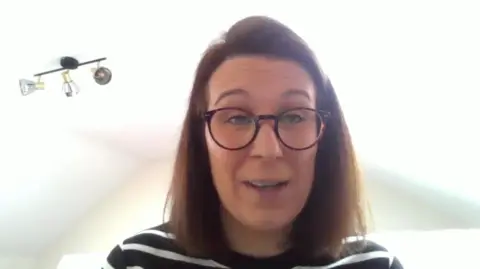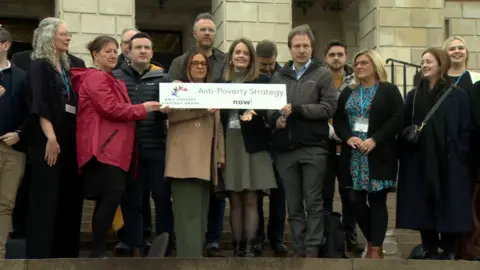Identifying benefit fraudsters is a 'distraction', campaigners say
 Getty Images
Getty ImagesCampaigners have described the reintroduction of 'naming and shaming' benefit fraudsters as "misguided" and a "distraction".
On Tuesday, the Communities Minister Gordon Lyons said the move was part of a "zero-tolerance approach".
The Department for Communities (DfC) stopped publishing the names of benefit fraudsters in 2020 following a decision by the Sinn Féin minister at the time.
However, Barnardo's NI said the move was "a distraction from the real issues that we are facing".
Misguided

Benefit fraud in Northern Ireland is estimated to cost more than £163m a year, according to the DfC - about 2% of total Stormont expenditure.
Lyons said the department received about 10,000 fraud allegations a year.
Trása Canavan from Barnardo's NI acknowledged that fraud was a problem in the system but said it was important that "people can access the benefits that they are absolutely entitled too and we should be proud to offer them as a society".

Dr Ciara Fitzpatrick said the minister was "misguided" in reinstating the practice of publicly identifying people who have been convicted of benefit fraud.
The law lecturer who specialises in the social security system and socio-economic rights said that the move will increase the fear amongst those claiming benefits.
"It is very easy to make a mistake when you are claiming social security and fraud, and error are actually grouped together in terms of the statistical analysis," Dr Fitzpatrick said.
"It's just a disproportionate response to what is a relatively small problem in the department for communities and we need to see a lot more focus go on tax fraud and other kind of frauds that impact those people who have more money in their pockets, not those people who are relying on the social security system."
Anti-poverty strategy

Campaigners gathered at Parliament Buildings on Wednesday to launch an Anti-Poverty Strategy Group, calling for the Northern Ireland Executive to produce an anti-poverty strategy as a matter of urgency
Daniel Holder from the Committee on the Administration of Justice said that Minster Lyons should get on with adopting the strategy "that has lain unimplemented for many, many years".
He said it was not a policy choice but instead "an outstanding legal obligation that hasn't been implemented".
A spokesperson for the DfC said that a strategy is currently in development and last week, Minster Lyons added that he would take this Anti-Poverty strategy to the executive.
The group want the plan to be based on evidence of objective need and underpinned by the Executive's duty to protect human rights.
Other demands include a call for the strategy to be fully resourced, have clear timebound targets, and adopt a lifecycle approach to address the different needs and vulnerabilities people face at different stages of their lives.
Commitment to anti-poverty strategy
Ms Canavan from Barnardo's NI said that there has been a lack of political action on poverty in Northern Ireland.
"There was a commitment made in 2006 that there would be an anti-poverty strategy and that was written into our legislation and yet we still haven't delivered that," Ms Canavan said.
We are really seeing a lack of political leadership and ultimately that means we have no plan in Northern Ireland about what we are going to do about poverty, we are tinkering around the edges but really, we are taking no real structural, systemic action," she added.
The Anti-Poverty Strategy Group includes organisations such as Trussell, Age NI, Disability Action, the Salvation Army, Advice NI, the Rural Community Network and representatives from trade unions, the community sector, the women's sector and the youth and children's sector.
